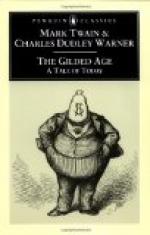Philip could not resist the inclination to pay a visit to Fallkill. He had not been at the Montague’s since the time he saw Ruth there, and he wanted to consult the Squire about an occupation. He was determined now to waste no more time in waiting on Providence, but to go to work at something, if it were nothing better, than teaching in the Fallkill Seminary, or digging clams on Hingham beach. Perhaps he could read law in Squire Montague’s office while earning his bread as a teacher in the Seminary.
It was not altogether Philip’s fault, let us own, that he was in this position. There are many young men like him in American society, of his age, opportunities, education and abilities, who have really been educated for nothing and have let themselves drift, in the hope that they will find somehow, and by some sudden turn of good luck, the golden road to fortune. He was not idle or lazy, he had energy and a disposition to carve his own way. But he was born into a time when all young men of his age caught the fever of speculation, and expected to get on in the world by the omission of some of the regular processes which have been appointed from of old. And examples were not wanting to encourage him. He saw people, all around him, poor yesterday, rich to-day, who had come into sudden opulence by some means which they could not have classified among any of the regular occupations of life. A war would give such a fellow a career and very likely fame. He might have been a “railroad man,” or a politician, or a land speculator, or one of those mysterious people who travel free on all rail-roads and steamboats, and are continually crossing and recrossing the Atlantic, driven day and night about nobody knows what, and make a great deal of money by so doing. Probably, at last, he sometimes thought with a whimsical smile, he should end by being an insurance agent, and asking people to insure their lives for his benefit.
Possibly Philip did not think how much the attractions of Fallkill were increased by the presence of Alice there. He had known her so long, she had somehow grown into his life by habit, that he would expect the pleasure of her society without thinking mach about it. Latterly he never thought of her without thinking of Ruth, and if he gave the subject any attention, it was probably in an undefined consciousness that, he had her sympathy in his love, and that she was always willing to hear him talk about it. If he ever wondered that Alice herself was not in love and never spoke of the possibility of her own marriage, it was a transient thought for love did not seem necessary, exactly, to one so calm and evenly balanced and with so many resources in her herself.
Whatever her thoughts may have been they were unknown to Philip, as they are to these historians; if she was seeming to be what she was not, and carrying a burden heavier than any one else carried, because she had to bear it alone, she was only doing what thousands of women do, with a self-renunciation and heroism, of which men, impatient and complaining, have no conception. Have not these big babies with beards filled all literature with their outcries, their griefs and their lamentations? It is always the gentle sex which is hard and cruel and fickle and implacable.




